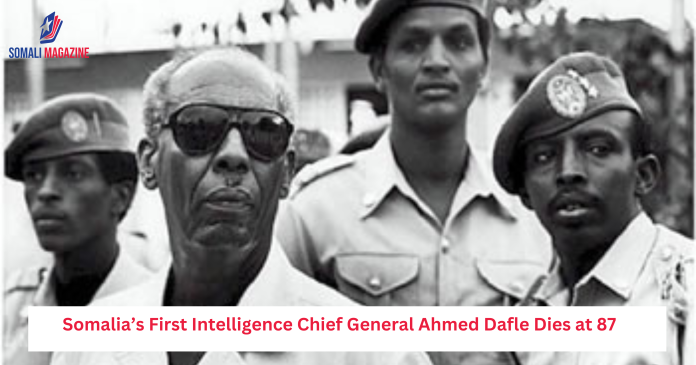Facebook Twitter (X) Instagram Somali Magazine - People's Magazine
A key figure during Siad Barre’s regime, Dafle led the powerful NSS and left a lasting legacy in Somali intelligence and politics.
General Ahmed Suleyman Abdalla Dafle, one of Somalia’s most powerful figures during the rule of President Siad Barre, has passed away in Brussels, Belgium. He died on Thursday at the age of 87, his family confirmed.
General Dafle was born in 1937 in Burco, a town in the Togdheer region in the northern part of Somalia. He became an important part of Somalia’s government and security system during the military regime that ruled the country from 1969 to 1991.
In 1971, Dafle became the head of the National Security Service (NSS), Somalia’s main intelligence agency at the time. Under his leadership, the NSS became one of the most feared and effective intelligence organizations in Africa. It played a major role in maintaining the Barre government’s control over the country, as well as collecting intelligence and dealing with internal threats.
He later took on other important roles in the Somali government. He served as the Minister of Interior, and was also a member of the Supreme Revolutionary Council, a powerful group of military leaders who helped run the country after the 1969 coup. Adding to his influence, General Dafle was also President Siad Barre’s son-in-law.
During the 1970s and 1980s, Dafle was considered one of the most influential and feared men in Somalia. His decisions affected both domestic politics and Somalia’s international relations. His role in intelligence and security gave him deep insight into the country’s affairs, and he had a strong say in how things were run.
His impact reached beyond Somalia as well. According to Fahad Yasin Haji Dahir, a former head of Somalia’s modern intelligence agency, the National Intelligence and Security Agency (NISA), General Dafle also supported liberation movements across Africa. These were groups fighting for independence or freedom from oppressive governments.
In a tribute posted on Thursday, Fahad described Dafle as “the most influential Somali politician on the African continent.” He said that Dafle played a big role in the success of Somalia’s intelligence services, especially during the Ogaden War in 1977, when Somalia tried to take over the Ogaden region of Ethiopia. Fahad said the NSS’s ability to gather Ethiopian military secrets helped Somalia during the early stages of that war.
Fahad also shared a personal note: while leading NISA, he named the Grand Mosque inside NISA headquarters after General Dafle, as a way of honoring his contributions to the agency and to the country’s security system.
General Dafle’s death comes at a significant time for Somalia. The country is currently working to rebuild and improve its security institutions, especially in the ongoing battle against the terrorist group Al-Shabaab. The government is focusing on creating a professional, effective security system that can protect the country and maintain stability.
General Dafle’s legacy remains a subject of strong opinions. While some remember him as a powerful and patriotic figure who helped build Somalia’s intelligence strength and supported African unity, others recall the fear and control that characterized the NSS during his time. Still, his influence on Somalia’s history, especially in intelligence and politics, is undeniable.
As Somalia continues to move forward and strengthen its national institutions, the memory of leaders like General Dafle—both their achievements and controversies—will continue to be part of the national conversation.

